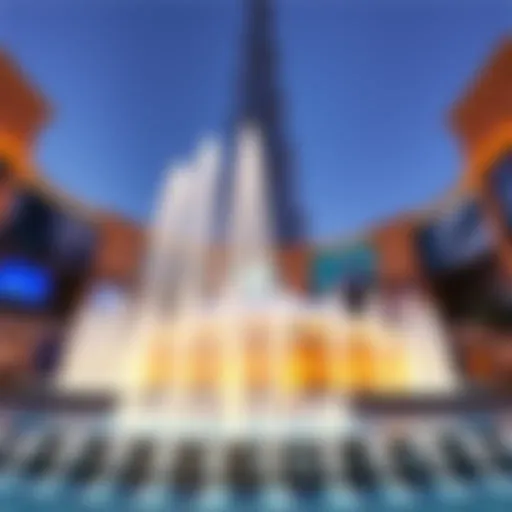Life in Dubai: Insights for Foreign Residents
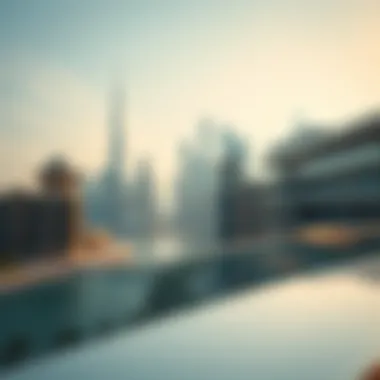
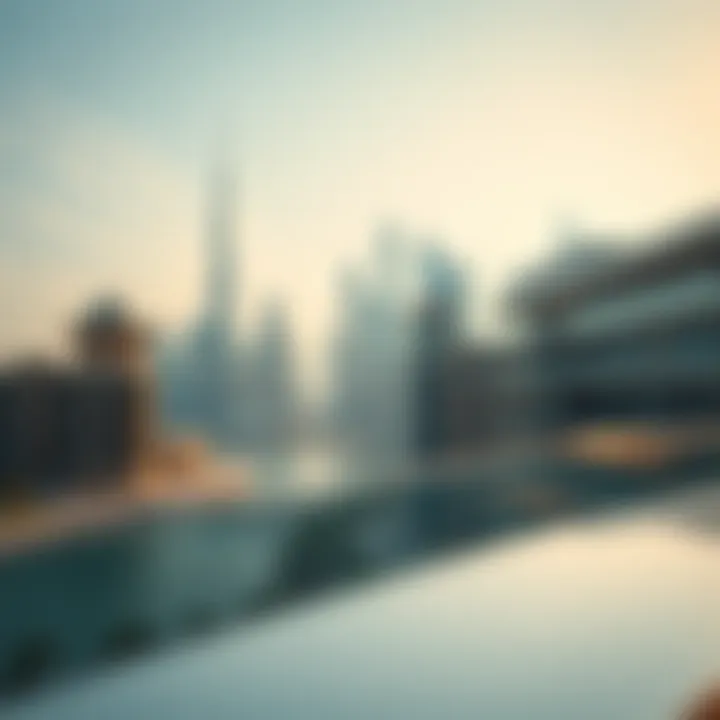
Intro
Living in Dubai as a foreign national is a journey filled with possibilities and challenges. The city, known for its skyscrapers and vibrant culture, attracts expatriates from all corners of the globe. Whether you're an investor eyeing lucrative opportunities, a homebuyer looking for the perfect residence, or a manager scouting talent in this bustling metropolis, understanding the nuances of life in Dubai is essential.
Dubai's expat community is a melting pot of cultures, where each individual can bring something unique to the table. Navigating this diverse environment necessitates a grasp of local customs and regulations. The journey doesn't just stop at adapting to a new culture; it extends to employment opportunities, legal obligations, and social integration.
In this piece, we will dissect several critical areas that define the expatriate experience in Dubai. We'll venture into market trends to see how the economy shapes the living landscape, delve into property insights to help you find your ideal home, and discuss the broader implications of living in such a vibrant city. This comprehensive overview aims to arm you with the knowledge required to thrive in Dubai's unique environment.
Identifying key factors that influence life here can enrich your understanding and enable a smoother transition. Thus, the likelihood of feeling out of depth within this bustling hub can diminish, making way for a richly rewarding experience.
Let’s dive into the market trends that impact life in Dubai.
Foreword to Life in Dubai
Navigating life in Dubai is like stepping into an intricately woven tapestry that boasts not only a vivid mix of cultures but also endless opportunities and challenges. For foreigners considering making this dynamic city their home, understanding the landscape is crucial. The significance of this topic cannot be overstated; knowing what to expect in Dubai can mean the difference between a smooth transition and facing unexpected hurdles.
First off, one must appreciate the unique melting pot that Dubai represents. With over 200 nationalities residing in the city, it's a place where traditions intertwine and multicultural interactions flourish. This diversity not only enriches the social fabric but also offers expatriates the chance to form connections that span the globe.
Consider also the economic environment. Dubai stands as a beacon for investors, entrepreneurs, and skilled workers. The job market is robust, offering varied employment opportunities ranging from technology to hospitality. For many foreigners, Dubai isn't just a place to live; it's a strategic hub to build their careers and delve into innovative markets.
However, it also brings along its own set of considerations. Understanding cultural norms, adapting to local customs, and familiarizing oneself with the legal aspects of residency can significantly impact the quality of life.
Additionally, it's crucial to grasp the emergent lifestyles and living conditions, which differ from those in many Western countries. Rental agreements, utilities, and community amenities may not follow expected patterns, leaving some expatriates puzzled if they are not informed ahead of time.
Cultural Landscape
When it comes to living in Dubai, the cultural landscape plays a pivotal role that shapes the entire expatriate experience. It’s not simply a backdrop; rather, it is the essence of daily life and societal interactions in this dynamic city. Understanding the various facets of Dubai’s cultural landscape can help foreigners adapt more smoothly and enrich their time in the Emirates.
Diversity of Nationalities
Dubai is a melting pot of cultures, where people from all walks of life coexist. The expatriate community is made up of individuals from over 200 nationalities. This remarkable diversity leads to a unique blend of traditions, cuisines, and lifestyles.
Imagine walking through the bustling markets or souks. You’re not just experiencing Emirati culture— you’re also tasting Indian curries, sipping on Vietnamese coffee, or sampling Italian gelato. Such culinary variety can be exciting for those who love to explore flavors. There's always something new to learn and experience.
Aside from food, festivals and celebrations from different cultures are embraced here. Ramadan, Diwali, Christmas, and Chinese New Year are often celebrated side by side, showcasing respect and appreciation for different traditions. This vibrant environment fosters an atmosphere of acceptance and broad-mindedness, enhancing social connections in the community.
Cultural Norms and Practices
Understanding the cultural norms in Dubai isn't merely recommendable— it’s essential for a seamless integration into society. Notions of respect, hospitality, and etiquette are paramount here. These norms often stem from Islamic traditions, and expats are encouraged to respect local customs, such as dressing modestly or refraining from public displays of affection.
~Here are key cultural practices that foreigners should keep in mind:~
- Greeting Customs: When meeting someone, a handshake is common. However, one should refrain from making physical contact with the opposite gender unless the gesture is initiated by them.
- Dining Etiquette: It's customary to eat with the right hand, and many locals prefer sharing meals rather than dining alone. If invited to a local home, it’s polite to bring a small gift.
- Understanding Public Behavior: In Dubai, public behavior is closely monitored. Outbursts of anger or loud arguments are frowned upon. Maintaining composure is a sign of respect.
Enhancing your understanding of these cultural norms not only helps to avoid faux pas but allows for meaningful interactions with the locals.
Language Considerations
While Arabic is the official language, English is widely spoken in Dubai, especially in business and among expatriates. Familiarity with basic Arabic phrases can positively impact your interactions. Saying simple words like “Shukran” (thank you) or “Marhaba” (hello) can endear you to locals.
However, language goes beyond mere words. It’s about understanding the dialects and colloquialisms that often emerge from the diverse community. For example, you might hear a mix of English and Arabic, known as “Arabizi,” spoken among the youth.
Those looking to conduct business or deepen relationships should consider learning a bit of Arabic. It demonstrates respect for the local culture and can open doors to opportunities that may otherwise remain closed.
In summary, grasping the cultural landscape of Dubai is crucial for foreigners aiming to thrive in this vibrant metropolis. The diversity of experiences, coupled with the rich tapestry of traditions, creates an inviting canvas for those willing to engage and explore.
Employment Landscape
The job market in Dubai is a critical aspect for foreign expatriates, given its robust economic framework and diverse opportunities. Understanding this landscape provides invaluable insights for newcomers on how to navigate employment possibilities in a city that consistently attracts global talent. Factors such as economic growth, governmental policies, and a growing demand for skilled labor not only enhance employment prospects but also dictate the pulse of professional life in this ever-evolving metropolis.
Job Market Overview
The job market in Dubai presents a mixed bag of opportunities and challenges. With a strong economy that has shifted from oil dependency to a more diversified portfolio, sectors such as tourism, trade, finance, and technology are rapidly evolving. In fact, Dubai’s strategic location as a gateway between East and West makes it an appealing destination for multinational companies looking to expand their operations.
Employment rates have shown an upward trend, making it apparent that companies are on the lookout for skilled professionals. The demand for roles in management, tech, and healthcare continues to grow, reflecting the broader trends shaping the economy. For expats, the potential for career advancement is considerable. Many companies offer attractive packages, including tax-free salaries, relocation assistance, and bonuses.
Moreover, expatriates often find themselves in diverse working environments, leading to valuable cross-cultural experiences which can enhance both personal and professional growth.
Common Employment Sectors
As expatriates consider moving to Dubai, it helps to understand which sectors are thriving. Some primary industries employing a large number of foreigners include:
- Hospitality and Tourism: With an influx of tourists year-round, there's a steady demand for skilled workers in hotels, restaurants, and travel companies.
- Construction and Real Estate: The city’s skyline is ever-changing, creating a continual need for engineers, architects, and project managers.
- Technology and IT: Given the push towards smart cities and digital transformation, roles in cybersecurity, software development, and data analysis are highly sought after.
- Education: International schools and universities actively seek out qualified educators, offering numerous opportunities for teachers from abroad.
In each of these sectors, adaptability and openness to new ideas can play a significant role in successfully navigating one’s career path.
Visa Requirements for Foreign Workers
Understanding the visa requirements is crucial for expatriates looking to work in Dubai. The framework for foreign employment is largely regulated by the UAE government, which has set clear guidelines.


To work legally in Dubai, foreigners must secure a work visa, typically sponsored by their employer. The key steps include:
- Job Offer: This is essential before applying for a visa. The employer will often assist with the process.
- Medical Fitness Test: A health check is required to ensure overall wellbeing and to rule out communicable diseases.
- Emirates ID Application: Once the work visa is approved, individuals must apply for a residency permit and Emirates ID.
- Renewals: Visas generally require periodic renewals, linking them closely to employment status and contractual agreements.
Having a thorough understanding of the visa process can significantly smoothen the transition into Dubai’s job market, ensuring all legal frameworks are adhered to. An online resource worth checking is UAE Government Official Portal to get the latest information on visa regulations.
Living Conditions
Living conditions are a fundamental aspect of life in Dubai for expatriates, impacting their daily experiences, social interactions, and long-term satisfaction in the city. Given the vast number of foreign nationals residing in Dubai, understanding the specifics of housing, cost of living, and transportation choices is essential for anyone considering this vibrant metropolis for relocation. The quality of living, safety, community amenities, and infrastructure plays a significant role in making informed decisions about whether to make Dubai a permanent home.
Housing Options
When it comes to housing options, Dubai offers a plethora of choices tailored to suit various lifestyles and budgets. From upscale apartments with breathtaking views of the Burj Khalifa to more modest accommodations in family-friendly suburbs, there is something for everyone.
- Apartments: Typically found in high-rise towers, apartments are quite popular among expatriates. Areas like Downtown Dubai and Dubai Marina boast luxury options, but many developments also offer affordable units in Jumeirah Lake Towers or Discovery Gardens.
- Villas: For those craving extra space, villas in communities such as Arabian Ranches or Jumeirah Village Circle cater to families and individuals seeking larger living areas. With private gardens and community features, these neighborhoods offer a blend of convenience and comfort.
- Shared Accommodation: Many newcomers opt for shared living to reduce costs. This option supports network building among expats who are often eager to connect, thereby easing the transition.
The housing culture in Dubai tends to be rent-heavy, with few opting to purchase. Rent agreements often require a security deposit and a few post-dated checks; understanding the market dynamics can help negotiate better terms.
Cost of Living Insights
Understanding the cost of living in Dubai is crucial. It can vary significantly based on lifestyle choices and housing locations.
- Housing Costs: Housing can take a significant bite out of the budget. Depending on the area, one-bedroom apartments can range from around AED 5,000 to AED 15,000 monthly.
- Utilities and Internet: Utilities (water, electricity) can average around AED 600, while broadband can go for AED 300. Expect fluctuations depending on usage and provider choice.
- Groceries and Dining: Shopping for groceries in Nashwan or Carrefour may cost less than dining out. Eating at restaurants can range anywhere from AED 30 for casual meals to AED 300 for upscale dining.
- Transportation: Consider also your daily commute. Public transport is affordable, yet taxis and Uber can add up quickly if used frequently.
Overall, while Dubai is known for its opulence, those who budget wisely can enjoy a balanced lifestyle without breaking the bank.
Transportation and Accessibility
Dubai boasts an extensive transportation system, making it accessible for residents and visitors alike. Here’s a breakdown of what to expect:
- Metro: The Dubai Metro is both affordable and efficient, capable of swiftly transporting you from one end of the city to the other. It’s often the preferred option for commuters.
- Buses: An extensive bus network complements the metro system, providing coverage to areas not directly serviced by the metro. Buses are air-conditioned, which is a boon during the scorching summer months.
- Taxis: Readily available and regulated, taxis operate throughout the city. They are a convenient choice, especially for areas outside the metro reach, but can be a bit pricier than public transport.
- Cycling: While not the most conventional way to get around, certain areas, such as Dubai Marina, have dedicated cycling paths, encouraging a more active lifestyle.
Accessibility is not just about transport; it's also about the design of neighborhoods. Most are crafted with residents in mind, featuring amenities, parks, and schools within easy reach, ensuring that everything you might need is just a stone's throw away.
"A good living environment isn’t merely about where you stay, but how you connect with what’s around you."
Legal Framework
Understanding the legal framework in Dubai is crucial for foreigners, as it encompasses the various laws and regulations that govern residency, employment, property ownership, and the rights of expatriates. Often, the legal landscape can be a maze for newcomers. However, familiarity with these laws can make living and working in Dubai more manageable and fulfilling. The framework not only protects expatriates’ interests but also enables them to contribute positively to the society and economy of this dynamic city.
Understanding Residency Laws
Residency laws in Dubai can be tricky, as they can vary based on one's nationality and employment status. In general, foreigners can obtain residency visas through employment, investment, or family sponsorship.
When someone receives a residency visa, it’s typically tied to their job. However, if that job changes or is terminated, they must navigate their residency status promptly. Without proper awareness, one might find themselves in a precarious situation which could lead to overstaying, hence incurring fines or legal difficulties.
Moreover, there are different categories of residency visas available:
- Employment Visas: Issued to those who engage in a job or business activity.
- Investor Visas: For those investing a set amount in property or a business.
- Family Visas: For expatriates sponsoring family members.
Understanding the nuances of these laws ensures that expatriates can maintain their residency status without complications.
Rights and Responsibilities of Foreigners
Foreigners in Dubai enjoy a host of rights, but they also bear specific responsibilities. Knowing these can help prevent misunderstandings in both personal and professional life.
Rights include:
- The right to work in accordance with the terms of their visa.
- Access to healthcare services, subject to health insurance requirements.
- Legal protection under the laws of the UAE.
Responsibilities include:
- Abiding by local laws and regulations.
- Renewing residency permits and visas in a timely manner.
- Maintaining an active health insurance policy that complies with the requirements set forth by local authorities.
Failing to uphold these responsibilities can lead to significant consequences, including legal action and loss of residency.
Real Estate Ownership Regulations
Real estate ownership in Dubai presents a lucrative opportunity for many expatriates. However, owning property comes with specific regulations that must be understood.
In Dubai, foreign ownership of real estate is allowed in designated areas, commonly referred to as freehold areas. This is essential for investors as various locations offer different advantages, such as proximity to key amenities and potential for property value appreciation.
Some key points regarding real estate regulations include:
- Expatriates can own 100% of residential properties in designated freehold areas.
- Properties must be registered with the Dubai Land Department.
- Foreign investors often require a residency visa to purchase property, emphasizing the intertwining of property ownership and residency laws.
As such, navigating the real estate landscape necessitates thorough understanding of both legal frameworks and market dynamics to make informed investment decisions.
In summary, familiarity with the legal framework regarding residency, rights, and property can significantly ease the integration experience for expatriates in Dubai. A solid grasp of laws not only helps prevent legal issues but also encourages a more seamless transition into life within this vibrant city. For further assistance, expatriates may seek legal advice or consult with local legal authorities to clarify any uncertainties regarding their residency and property ownership.
Healthcare System


Access to a robust healthcare system is crucial for expatriates in Dubai. As a rapidly growing hub of business and tourism, the city's healthcare services reflect its commitment to quality and innovation. Understanding how the healthcare system operates can greatly influence foreigners' quality of life and peace of mind while living in this vibrant city.
Healthcare Facilities Overview
Dubai is home to a vast array of healthcare facilities, ranging from government hospitals to private clinics. The Dubai Health Authority manages public health standards while ensuring that residents have access to free or low-cost medical services. Facilities like the Cleveland Clinic Abu Dhabi and Mediclinic City Hospital exemplify the high standard of healthcare available. These institutions are equipped with state-of-the-art technology and staffed by highly trained professionals.
Another significant aspect of healthcare facilities in Dubai is the wide availability of specialized clinics and hospitals. For instance, if you need specific treatment, such as dental care or physiotherapy, you'll find numerous options throughout the city. This availability promotes a sense of security among expatriates, knowing they can get the care they need without long waits.
Health Insurance Requirements
In Dubai, having health insurance is not just a good idea—it's a legal requirement for expatriates. The city’s many employers typically provide health insurance as part of their employment packages, which often covers the employee and their immediate family. However, it's wise to thoroughly review any health insurance policy. Don’t overlook the details: understand what is covered, such as routine check-ups, emergencies, and dental care.
Moreover, expatriates can also purchase private health insurance if their employment doesn’t offer coverage. Options are plenty, and some people prefer to customize their policies to better suit their needs. The key is knowing the minimum requirements set by the government, which must include coverage for medical emergencies. As regulations can change, staying abreast of the latest requirements is essential for all foreign workers.
Access to Medical Services
Accessing medical services in Dubai is structured and user-friendly, making it easy for expatriates to receive the care they need. Most hospitals and clinics operate on an appointment basis, so it's advisable to schedule visits in advance. However, urgent care facilities are also available, ensuring that immediate health issues can be addressed promptly.
Public hospitals generally do not require appointments for emergencies, and they welcome patients at any hour. On the other hand, private clinics have a faster service but usually entail higher out-of-pocket expenses.
Additionally, many medical institutions use advanced technology to facilitate online appointments and consultations. This not only saves time but accommodates diverse schedules of busy expatriates. Telemedicine is also on the rise, giving patients the option to consult with healthcare professionals from the comfort of their homes.
"In addition to physical health services, mental health care is gaining recognition in Dubai, with an increasing number of specialists providing counseling and therapy for expatriates facing cultural adjustment challenges."
Social Integration
Social integration in Dubai is a significant topic for expatriates, as it influences not only their personal experiences but also their professional and social lives. Understanding the nuances of integration becomes critical in a city that is a melting pot of cultures and nationalities. When foreigners move to Dubai, they often find themselves navigating a new world filled with opportunities and challenges. Good social integration can lead to a more fulfilling life in this vibrant city, allowing expatriates to feel at home.
Building a Community
Settling in a new city can feel like trying to fit a square peg in a round hole at times. However, Dubai offers ample opportunities to build a community. There are various platforms and meet-ups organized for expatriates, ranging from sports leagues to hobby groups. This variety makes it easier to find like-minded individuals who share similar interests.
“Finding your tribe in Dubai can transform your experience from being just another foreigner to a valued member of the community.”
Online platforms like Facebook groups or Meetup.com can serve as great starting points for expatriates looking to build their network. Familiarizing oneself with local customs and engaging in community activities can also help in creating bonds that go beyond social pleasantries.
Cultural Events and Activities
Dubai has a dynamic calendar of cultural events and activities that are perfect for fostering social integration. From the Dubai Shopping Festival to the Art Dubai exhibition, these events attract numerous expatriates and locals alike.
In addition, the city celebrates various national days, sports events, and music festivals where foreigners can immerse themselves in local culture. Participating in these activities not only enriches the foreigner’s experience but also offers a unique opportunity to meet people from diverse backgrounds.
Some noteworthy events to keep an eye on include:
- Global Village: A cultural extravaganza showcasing food, crafts, and performances from around the world.
- Dubai Opera: Offers a range of performances, from classical music to contemporary dance, catering to a wide audience.
- Annual Food Festival: A culinary journey that allows expatriates to taste flavors from around the globe.
Support Networks for Expatriates
For expatriates, navigating the Dubai landscape can sometimes feel like a minefield. Support networks become essential during this transition. Various organizations offer counseling and logistical support, acting as lifelines for individuals feeling overwhelmed. Whether through expatriate clubs or international schools, there are resources that enable newcomers to feel less isolated.
Engaging with local charities or volunteering groups can also enhance the sense of belonging. Many expatriates find that contributing to community service or local projects not only enriches their lives but also creates lasting friendships.
In summary, social integration is crucial for expatriates in Dubai. By building community ties, participating in cultural events, and leveraging support networks, newcomers can transition more smoothly into their new environment. This fosters a positive experience while establishing a sense of belonging in the ever-evolving tapestry that is Dubai.
Education and Schools
Education stands as a cornerstone in the journey of expatriates settling into Dubai. For many foreign families, the availability and quality of education play a critical role in their overall satisfaction and adaptation to life in this bustling metropolis. As they navigate through a myriad of cultural and societal changes, the education system in Dubai presents various opportunities and considerations that shape not just the academic experience but also the social fabric of families.
Schooling Options for Children
Dubai boasts an impressive range of schooling options catering to diverse nationality and cultural backgrounds. The education system consists of public schools, which primarily serve Emirati children and operate under the Ministry of Education regulations, and private schools, which are often preferred by expatriates.
Foreign families frequently opt for private institutions, which provide international curricula such as the British, American, and International Baccalaureate programs. Here are some notable choices:
- British Schools: Catering to the British expatriate community, these schools offer the English National Curriculum, generally leading to GCSEs and A-levels. The schools, like the British School Al Khaleej International, focus on academic excellence, albeit with additional emphasis on character development.
- American Schools: These institutions provide an American education system with Advanced Placement (AP) options, preparing students for universities across the United States. Schools like Dubai American Academy are well-regarded for their comprehensive programs.
- IB Schools: Offering a rigorous curriculum emphasizing critical thinking and global awareness, schools like the International School of Arts and Sciences implement a holistic approach to education, aiming to mold well-rounded students.
While these options provide a solid educational foundation, the choice of school also involves considerations like cost, location, and extracurricular offerings, which can significantly influence a family's experience in Dubai.
Higher Education Institutions
As the educational landscape evolves, Dubai has made significant strides in higher education as well. The establishment of local and international universities enhances the options available for expatriates pursuing advanced studies. Notably, institutions such as the University of Dubai and Heriot-Watt University offer programs that meet global standards and cater to skilled expatriates seeking further education.
Collaboration with international universities also enriches the academic environment in the city. Universities like the American University in Dubai and the British University in Dubai provide degrees that align with global accrediting bodies, thus ensuring that students receive education on par with international metrics. This variety encourages not only academic investment but also fosters a sense of community among diverse student demographics.
Educational Standards and Curriculum
In Dubai, the educational standards are stringently governed by the Knowledge and Human Development Authority (KHDA), which ensures that institutions adhere to quality benchmarks. This governmental oversight aims to maintain high teaching standards and improve student outcomes across all schools.
The curriculum is often tailored to meet international benchmarks, providing students with comprehensive education designed to prepare them for a globalized world. Expectedly, the emphasis on science, technology, engineering, and mathematics (STEM) alongside arts and sports reflects a balanced educational approach.
Foreign families can also witness structured assessments, which play a significant role in evaluating the academic performance of students. This ensures that parents remain well-informed about their children's academic journeys, allowing for adjustments when necessary.
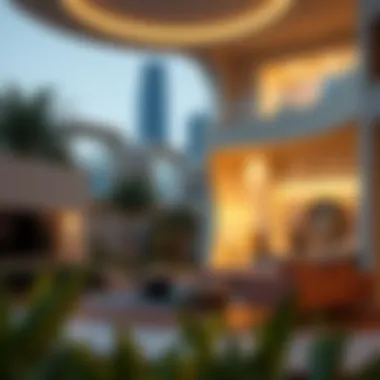
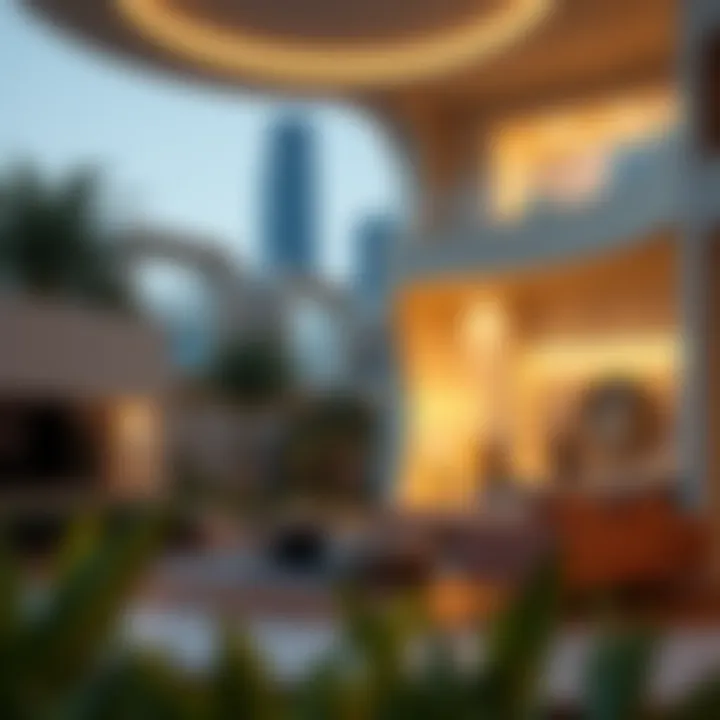
One must also consider that while the educational environment in Dubai is conducive to high academic achievement, cultural sensitivities necessitate awareness and respect for the Emirati culture, which schools actively endorse as part of their curricular frameworks.
"Dubai’s educational reforms aim to evolve continuously, fostering a climate that encourages innovation and excellence across all levels of learning."
In summary, the education system in Dubai offers a diverse range of schooling and higher education options tailored to meet the needs of expatriates. Familiarity with these elements can empower foreign families to make informed decisions regarding their children's education, significantly influencing their overall experience in the city.
Challenges Faced by Foreigners
Adjusting to life in Dubai can be a thrilling yet daunting experience for expatriates. While the allure of a bustling city filled with opportunities is appealing, it’s essential to recognize the challenges one might face. Understanding these challenges not only helps with preparation but also paves the way for smoother transitions into the local environment. It’s about knowing the ropes in a place that stands firm on its unique culture, legal structure, and social norms.
Cultural Adjustments
Cultural shifts can feel like stepping into a whole new world, especially for those hailing from vastly different backgrounds. Expatriates often find themselves navigating a complex tapestry of traditions and societal values that may contradict their own. One might experience culture shock, where the initial excitement gives way to feelings of disorientation and confusion.
A significant cultural adjustment comes with understanding social etiquettes. For instance, discussing certain topics may be considered taboo. It's wise to steer clear of political debates or religious discussions in casual settings. Furthermore, understanding how to appropriately greet individuals—using Arabic phrases such as "As-salamu alaykum"—can greatly enhance social interactions.
Building relationships with locals often requires patience and respect for their customs. Even small gestures, like participating in Ramadan by abstaining from food in public during daylight hours, can aid in integrating into the community. Remembering that cultural acceptance fosters social connections is crucial.
Legal and Bureaucratic Hurdles
Another barrier foreigners face is the legal and bureaucratic environment. Dubai’s laws can sometimes be a labyrinth, filled with regulations and procedures that seem daunting. Navigating everything from residency permits to work visas requires attention to detail. Missteps can have serious consequences, including fines or deportation.
To make life easier, it’s advisable to familiarize oneself with visiting government websites or attending workshops that explain the legal landscape in Dubai. Certain resources, such as UAE Government Portal, offer information on visa types, rules, and recent updates that foreigners should be aware of.
Moreover, understanding the differences in property ownership laws for expatriates is vital, especially for those looking to invest in real estate. These laws can be quite different from what one might expect and can vary depending on the emirate.
Navigating Social Norms
Social norms in Dubai are distinctly shaped by its Islamic culture. For foreigners, adhering to these norms is not just courteous but often mandatory. Dress codes, for instance, lean towards modesty. Expatriates are encouraged to dress conservatively, particularly in public places or when visiting religious sites.
Social gatherings might also differ from what expatriates are used to; observing local traditions during events can enhance their understanding of the community. Alcohol consumption, while permitted in certain establishments, is heavily regulated and comes with stipulations. Being unaware of the rules regarding public drinking can easily land someone in hot water.
Engaging in volunteer work or participating in community events can help bridge the gap between cultures. Such interactions often smooth out the ride, helping foreigners become part of the fabric of the local community and carving their niche in this vibrant city.
Ultimately, recognizing and addressing these challenges not only aids in adapting but also enriches the overall experience one has while living in Dubai. From cultural etiquette to legal understanding and social norms, every aspect presents a unique learning opportunity for expatriates.
Contributions of Foreigners to Dubai
Foreigners have become an integral part of Dubai's growth and evolution, shaping its landscape in various profound ways. Their contributions are essential not just for economic reasons but also for fostering cultural interactions and facilitating advancements in different sectors. This section sheds light on the significant impact that expatriates have had on Dubai, examining the economic, cultural, and innovative dimensions of their involvement.
Economic Impact
The economic contribution of foreigners to Dubai cannot be overstated. Expatriates make up a substantial portion of the workforce, which is vital for sustaining the city's dynamic economy. Many foreign professionals bring specialized skills and expertise crucial in sectors such as finance, healthcare, and tourism.
"Expats play a pivotal role in building and sustaining Dubai's economy through entrepreneurship and skill development."
- Job Creation: Expatriates not only fill essential roles; they also create job opportunities for locals through new businesses and start-ups. As foreign entrepreneurs set up shop, they often hire local talent, fostering an environment of growth and mutual benefit.
- Investment: Foreigners often invest in real estate, infrastructure, and various businesses, injecting capital into the economy. This investment enhances the city’s infrastructure and creates a thriving commercial landscape, enhancing the city’s appeal as a global business hub.
- Trade and Commerce: Dubai’s position as a trading hub is significantly bolstered by foreign participation. Expatriates facilitate international trade, which enhances the regional economy and increases Dubai's significance on the world stage.
Cultural Enrichment
The vibrancy of Dubai’s cultural landscape is largely due to the multitude of nationalities that call it home. With residents from all corners of the globe, the cultural fabric of Dubai is rich and diverse.
- Diverse Cultural Events: Regular festivals and cultural events celebrate various traditions, providing platforms for expatriates to showcase their heritage. Events such as the Dubai Shopping Festival and Global Village are fine examples where cultural amalgamation occurs.
- Cuisine Influence: Food is another avenue through which culture flourishes. The array of international cuisines serves as a testimony to the diverse population, with restaurants offering everything from traditional Emirati dishes to Chinese, Indian, and Italian fare.
- Art and Music Scene: Creative impulses thrive in this multicultural environment. Art galleries, music festivals, and theater performances often draw on the influences of the expatriate community, enriching the artistic scene and making culture accessible to all.
Innovation and Skills Transfer
The presence of foreign professionals contributes significantly to the innovation landscape in Dubai. Many expatriates come armed with international experience and cutting-edge ideas that drive progress in various industries.
- Knowledge Sharing: Foreign workers often share best practices from their home countries, enhancing local knowledge bases. This exchange of ideas fosters a collaborative atmosphere, crucial for driving forward sectors like technology and healthcare.
- Research and Development: Expatriates are often at the forefront of research initiatives in Dubai, undertaking projects that align with the city’s vision for innovation. Such projects emphasize sustainability and technology, which resonate with global trends.
- Start-up Ecosystem: Increased foreign talent contributes to a buzzing start-up scene, where innovative solutions are developed to tackle both local and global challenges. Initiatives like Dubai Silicon Oasis and Techstars Dubai exemplify how this culture of innovation is fostered through collaboration between local and foreign entities.
In summary, foreigners have a significant role in shaping Dubai into the vibrant and multifaceted city that it is today. The economic benefits are matched by cultural enrichment and a spirit of innovation that enhances the community as a whole, making Dubai a unique nexus of global interaction.
The End
In wrapping up our discussion about life for foreigners in Dubai, it becomes crystal clear how vital it is to take stock of what this city offers and the unique challenges it presents. Understanding these factors allows expatriates to not merely survive, but thrive in an environment that sometimes feels daunting due to its cultural and regulatory nuances.
First and foremost, preparation is key. Foreigners making the move to Dubai need to familiarize themselves with the cultural landscape, which is a rich tapestry woven from diverse threads. The ability to adapt to new norms and practices can significantly influence one’s quality of life, particularly in a setting where traditions might differ vastly from one’s own.
Employment opportunities in Dubai are plentiful, yet competition can be fierce. Foreigners should evaluate potential job markets and seek positions that align with their skills and experience. This could mean brushing up on specific qualifications or even learning a bit more about the local business etiquette.
Legal considerations also come into play, and navigating residency laws can be like walking through a maze. Understanding rights and responsibilities is paramount to avoid pitfalls that could lead to complicated bureaucratic entanglements later on.
Social integration stands out as a critical area for success. Building connections through community involvement and social activities not only eases cultural adjustments but also opens doors to invaluable support networks. As the saying goes, "it takes a village," and this rings true in the cosmopolitan environment of Dubai.
Moreover, the contributions of foreigners to Dubai are substantial—enriching the local culture, fueling the economy, and fostering innovation. It's this interchange of ideas and skills that propels the city into the future, making it a vibrant hub for creativity and commerce.
In summary, the importance of being well-informed cannot be understated. Foreigners are not just passive residents; they play an active role in shaping Dubai's narrative. By understanding the highs and lows of life in this city, expatriates are better equipped to make informed decisions. So whether it’s about housing, employment, healthcare, or social connections, having a pulse on these aspects will make the transition smoother and more rewarding.
In exploring these various threads of life in Dubai, we uncover not just information, but also insights that pave the path for a more fulfilling experience in this captivating corner of the world.
"Life in Dubai is more than just living in a city; it’s about embracing a culture that shapes your perspective and enriches your journey."
For more information about living in Dubai, you can refer to local resources like Dubai Health Authority or community networks on platforms like Facebook.
Diving into life in Dubai may seem a hefty task, but with a comprehensive understanding, a touch of patience, and an open mind, foreigners can find themselves right at home in a place that surprises at every turn.
For more insights and experiences from expatriates, readers can explore forums on Reddit for real-life stories and practical advice.









